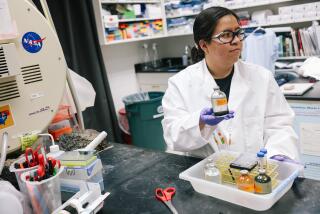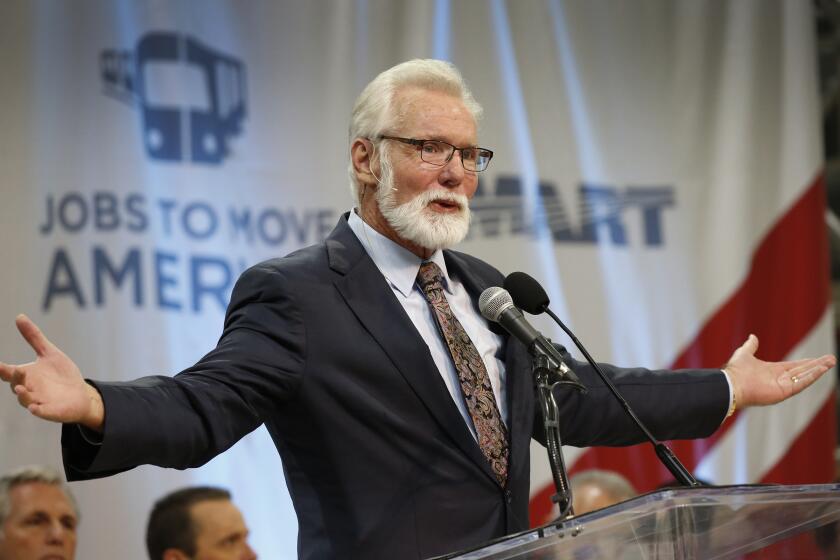Astronaut Ride to Pursue Dual Interests at UCSD
- Share via
Casting about for a new career challenge, Sally K. Ride, the first U.S. woman astronaut, said she sought to pursue two interests: teaching and the space program.
Physicist Ride, who is winding up a two-year-stint as a fellow at Stanford University’s prestigious Center for International Security and Arms Control, has found such a dual role at UC San Diego.
On Friday, UC San Diego announced that Ride has been appointed a professor of physics at the university, and that she will serve as director of the California Space Institute, part of the university’s Scripps Institute of Oceanography. Her time will be divided between the two responsibilities.
Cal Space, as it is known, coordinates space-related research at all eight general campuses in the University of California system. It also serves as a liaison with the state aerospace industry in developing new technologies and their applications.
Ride, whose appointment becomes effective July 1 and who is already slated to teach undergraduate physics classes in the fall, said the joint positions dovetailed in singular fashion with her career plans.
Package ‘Very Attractive’
“This will allow me to pursue my interest in physics and in the space program,” Ride said Friday in a brief telephone interview from Stanford. “The package of those two was very attractive. . . . It’s a good opportunity for development.”
Ride, who participated in two space shuttle missions in 1983-84, also served on the presidential commission that investigated the fatal explosion in 1986 aboard the space shuttle Challenger, and later directed a National Aeronautics and Space Administration panel on the future of the space program. She stepped down from NASA in 1987 to assume the position at Stanford. She remains one of the nation’s best-known ex-astronauts, although she has shunned interviews and is said to have not enjoyed the public exposure that accompanied her position as the first U.S. woman in space.
Ride expressed her view that the shuttle program was developing very well since the Challenger accident, and that NASA was “paying an appropriate amount of attention to safety.”
Research Outpost on Moon
She reiterated her well-known interest in establishing a permanent research outpost on the moon, and urged Congress, the Bush Administration and NASA to coordinate a long-term plan for space exploration. “If it’s not developed,” she said, “the space program will be fragmented.”
Space policy debates in Washington currently focus on a number of potential avenues, including whether to fund a manned space station, an expedition to Mars, or both.
At UC San Diego, there was a sense that Ride’s arrival was a coup. The former astronaut said she had been in touch with several universities in recent months, but the San Diego offer was the “most appealing.” She is to be paid a full professor’s salary of $64,000, plus a $6,000 stipend as the Cal Space director, a university spokeswoman said.
“Sally was sort of a natural for this,” said Edward A. Frieman, director of the Scripps Institute of Oceanography, which is part of the UC San Diego campus. “Clearly, Sally has immense experience in areas that relate to this (space), and impinge on it.”
Added UC San Diego Chancellor Richard C. Atkinson: “I can think of no one better suited to lead Cal Space into the next decade and beyond.”
Ride said it was premature to say in what direction she hoped to guide the Cal Space institute, which was created by the California Legislature in 1979. The idea was to coordinate disparate space research throughout the system. Cal Space has a budget of $3.3 million, including university funds and grants, and employs 28 full- and part-time staff members.
Ride did express a clear interest in expanding satellite remote sensing of the Earth, a growing field in which space images are used to study a wide range of environmental phenomena, from global warming to the destruction of rain forests. Scripps is already heavily involved in such monitoring, and is expecting to conduct even more related research.
Other fields of research coordinated by Cal Space include climatology, space resources, propulsion and robotics. Specific research projects include cloud effects on radiative energy, marine production, advanced propulsion systems and El Nino, the Pacific current that affects fisheries and climate.
Ride, 38, who is single and a native of Encino, holds master’s and doctorate degrees in physics from Stanford, as well as an undergraduate diploma from the same university. University of California regents approved her appointment at UC San Diego this week.
At Cal Space, she will replace James Arnold, the founding director, who is stepping down to devote full time to teaching and research.
More to Read
Sign up for Essential California
The most important California stories and recommendations in your inbox every morning.
You may occasionally receive promotional content from the Los Angeles Times.










